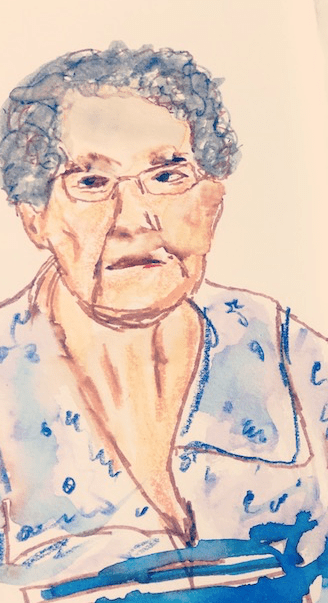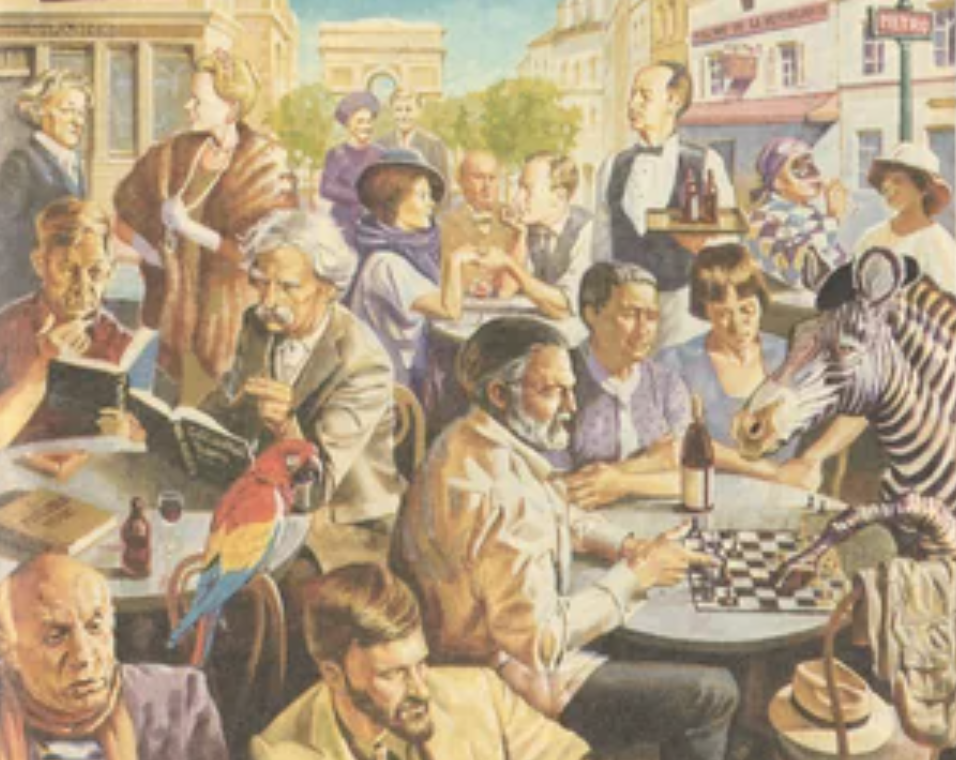My Virginia great-grandmother (maternal) made heavenly biscuits. They were flaky as pastry, rich with butter. They hit your tongue with a tang of salt and buttermilk and felt like a warm feather bed on a cold winter morning. Hymns might have been written about those biscuits and lost souls recovered. Granny’s biscuits were the culinary equivalent of a hug and a rescue, but better because you could put gravy on them. As a child, I sat at the Formica-topped table in the time traveler’s kitchen of Granny’s white frame farmhouse, and reached across the table past platters of fried chicken, bowls of potatoes, beans, corn and some succulent concoction of sweet home-canned tomatoes, cured pork and spaghetti noodles that Granny called “hot dish” for another biscuit.
Mom and Nana would move the plate and bat my hand away. You’ll get fat if you have another. Granny would reach over to the still-warm top of the old metal stove and hand me another biscuit straight from the pan, eyes warm, a tacit understanding shared across the seven decades separating us, one that said, these biscuits are my gift to you, of course you should have them.
~~
My Mississippi great-grandmother (paternal), had this magical bed. A great four-poster thing, hung with gathered handmade lace canopies, draped in pale, soft linens delicately embroidered, stacked with feather pillows, and situated in the center of her Wedgwood blue bedroom like a some glorious tall-masted yacht to the land of Nod. When I came to visit, still a little girl, I told her, your bed is most beautiful thing I’ve ever seen. Mamaw asked if I’d like to sleep in it, just for tonight, and I told her it would be dreamy, but the bed was too tall. My parents eyed the arrangement. They didn’t think I could summit its Himalayan heights. She produced a set of stairs, perfectly sized for tiny girl feet, as if to say, got you covered, as if to say, don’t be afraid of the climb, air’s better up here anyway.
~~
Nana says Granny always made extra biscuits. Not just for her hungry progeny, of whom there were many. But for the farm workers that came to help her husband harvest the tobacco crop, and the tenant farmers that came for a season and occupied the old farmhouse down the road, or the children of the tenant farmers that drifted town to town and ran barefoot through the red dirt fields, the family and neighbors, the parishioners at Methodist church down the hill, the lonesome and hungry that straggled up the highway in Franklin County in the darkest years of the Depression. She was a folk ballad, then, a sad country song, a young woman with five children and a crippled husband, who lost his brother and unbent spine to coal mine collapse. They were forced back east to eke a living out of the red clay of family lands in a Piedmont county best known for moonshine, in the foothills of the Blue Ridge. She was new to the grassy expanse bound by rural highways and the machinations of cash poor landowners stubbornly hanging on to unprofitable family land. Granny had come up in town, in a boarding house for railroad men, the only daughter of its proprietress, and thus keenly aware of not just the rules governing hospitality, but the way a full belly could revive a weary traveler. And perhaps she identified with them– the men on the road, the families that came in to harvest. There was an Italian migrant worker, whose wife befriended my grandmother during the worst of the depression years, as she struggled with children and in-laws and her husband with the broken back. From the Italian woman, perhaps came the hot dish, various desserts with a certain Old-World richness and delicacy. And I imagine those two women busying about the farmhouse the kitchen, trading their respective homesick flavors and secrets for the miraculous production of infinite baked goods from meagre scraps of flour and fat.
~~
Mamaw came to Mississippi from teacher’s college and married a man almost twice her age. He was handsome, comparatively rich in a place where middle class would have looked like unimaginable luxury. They had four children together in a tall brick house with ceiling high enough to accommodate the four-poster beds. He minded the cotton farm. She and the children spent summers and flood seasons at her parents’ inn in the North Carolina mountains, where she learned the rules governing hospitality and how a good meal and few nights’ respite might soothe an anxious and weary soul.
When her husband died, in the middle of the Depression, Mamaw found herself alone in the tall brick house in the center of the remote, green expanse of rural community perennially teetering on brink. I imagine her in the house, alone sitting up at night on her high-masted bed, a new captain blown off course, trying to find bearings on a worried sea of Delta green. She wasn’t a farmer or a businesswoman, but a young widow with four young children. She might have left, and who could have blamed her, settled the debts with the property and started over. But she didn’t. Like any good teacher, she learned, and what she learned she shared. No one can thrive in a community that is starving. So she learned the business of the farm and then learned how to turn it into more than just agricultural labor. She’d start cottage industries. She’d employ her neighbors. She’d feed her community. They’d produce something more than just sweat and raw material. They could learn skills that could travel beyond the fields.
Unsurprisingly, for a woman with magical beds, the most successful was the one that made blankets and bed linens.
~~
My mother studied classics in college. When I was a child, she would sit on my bed and read the myths to me. I loved them. I knew them better (still do) than I do stories from the Bible. The gods were tricky, petty. They didn’t make it easy on people. They dressed as beggars and knocked on doors. They came down hard on hubris, but maybe even harder on inhospitality. You don’t deny the weary traveler her biscuit, her blanket, her place, even if it’s only for a time, as a member of your community.
Like most idea that come appended to the word Southern, the famed hospitality of my ancestral region is a tricky business. There’s a particular kind of hypocrisy to a person who’d absolutely feed a neighbor at a time of duress but deny them their basic civil (or even human) rights. Neither of my great-grandmothers were free of prejudice, and almost certainly in small (Granny) and perhaps large (Mamaw) ways perpetuated it. They were white women in the rural Jim Crow South. They were raised to believe you take care of your people, at a time when your people was understood to comprise an exceedingly narrow class of human being. That my great-grandmothers chose to defy these standards and share when it would have been acceptable, even encouraged, to hoard what they had and put walls between themselves and their communities was smart, brave, and, like, you know, pretty fucking cool. Sometimes I suspect it’s because they were, in their own ways, outsiders themselves. They hadn’t come from the land they became the stewards of. And perhaps, they both stood on respective front porches, hundreds of miles away from each other, bewildered by worry, by grief, by challenges they never imagined they’d have to face, by themselves, or at all, and realized that sharing what you have means that you’d don’t have to go it alone.
~~
On Wednesday, July 7, 1948, a columnist named Paul Flowers at the Memphis Commercial Appeal covered one of Mamaw’s annual fish fries. And as she had, every year, Mamaw pulled out picnic tables under the pecan trees, and invited several hundred, workers, strangers, family and friends to dine on her front lawn. Almost all of them had been there with her through the Depression. Writes Flowers:
There came a hard times a few years ago, and with it a scarcity of jobs. So Mrs. Fields opened up a bedspread factory, and provided materials, and showed folks, many of them old ones, how to make bedspreads, so that even many of the men were tufting spreads. Then she sold those pieces of handicraft and there was money for all that wanted to work.
No wonder there’s a reciprocal feeling of loyalty and friendliness. Where else will a woman, a grandmother at that, spend days preparing the best food money can buy, spreading it on long tables, and bidding workers and neighbors to come and make merry? Who else but Mrs. Fields would have thought to send trucks all over the place, to bring in all who wanted to come? Especially for old folks and mothers with tiny babies and small children (Flowers, Paul. “Greenhouse.” Memphis Commercial Appeal, 7 July 1948).
Mr. Flowers doesn’t come right out and say that Mamaw was the white lady in the Big House and the vast majority of her party’s attendees were black. But he alludes to it, and it complicates the picture. Flowers even seems to struggle with it, both celebrating the event and acknowledging a long-shadow of paternalism. I can’t deny any of that. As a student of history, I can’t tell this story in a way that makes that part go away.
But I suspect Mamaw threw community-wide parties every year because she loved parties and she loved her friends and neighbors and workers, because they had helped her, and because no one survives in a vacuum. We depend on each other, perhaps more than we want to admit, almost certainly more than we know.
~~
My biscuits are good, not the good-enough-to-inspire-poetry good like Granny’s, but they’re a work in progress. I’m a messy cook and I have a small kitchen, so I have to really love you to make them. Because you know, my biscuits are my gift to you, and I always make loads of extras because you never know what weary traveler might arrive at the door
“The Fields family,” wrote Paul Flowers, about Mamaw, “carries on a long tradition, a tradition of justice and friendliness, and most of all, care for those who need care.”
It’s not bad as mission statements go. I think I do an okay job, not good-enough-to-inspire-newspaper-columns good, but I’m a work in progress. My beds aren’t nearly as pretty as Mamaw’s, but there are always fresh linens in the guest room and a foot stool if you need help climbing up.




